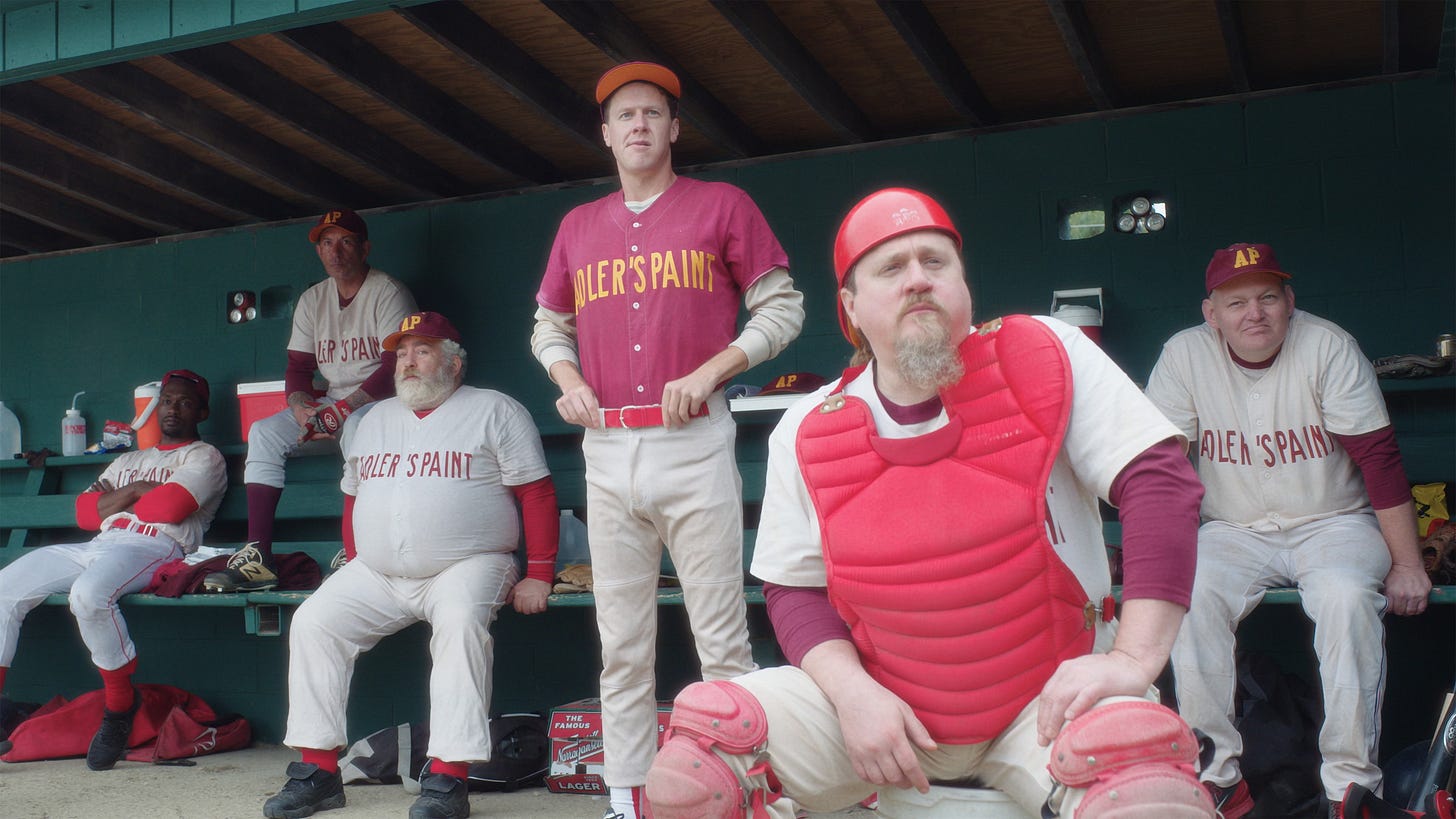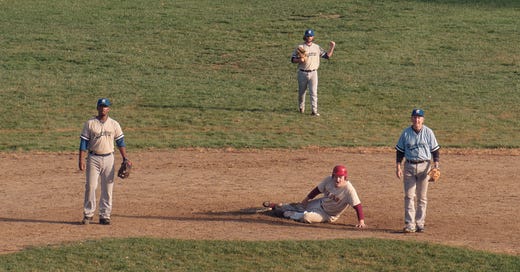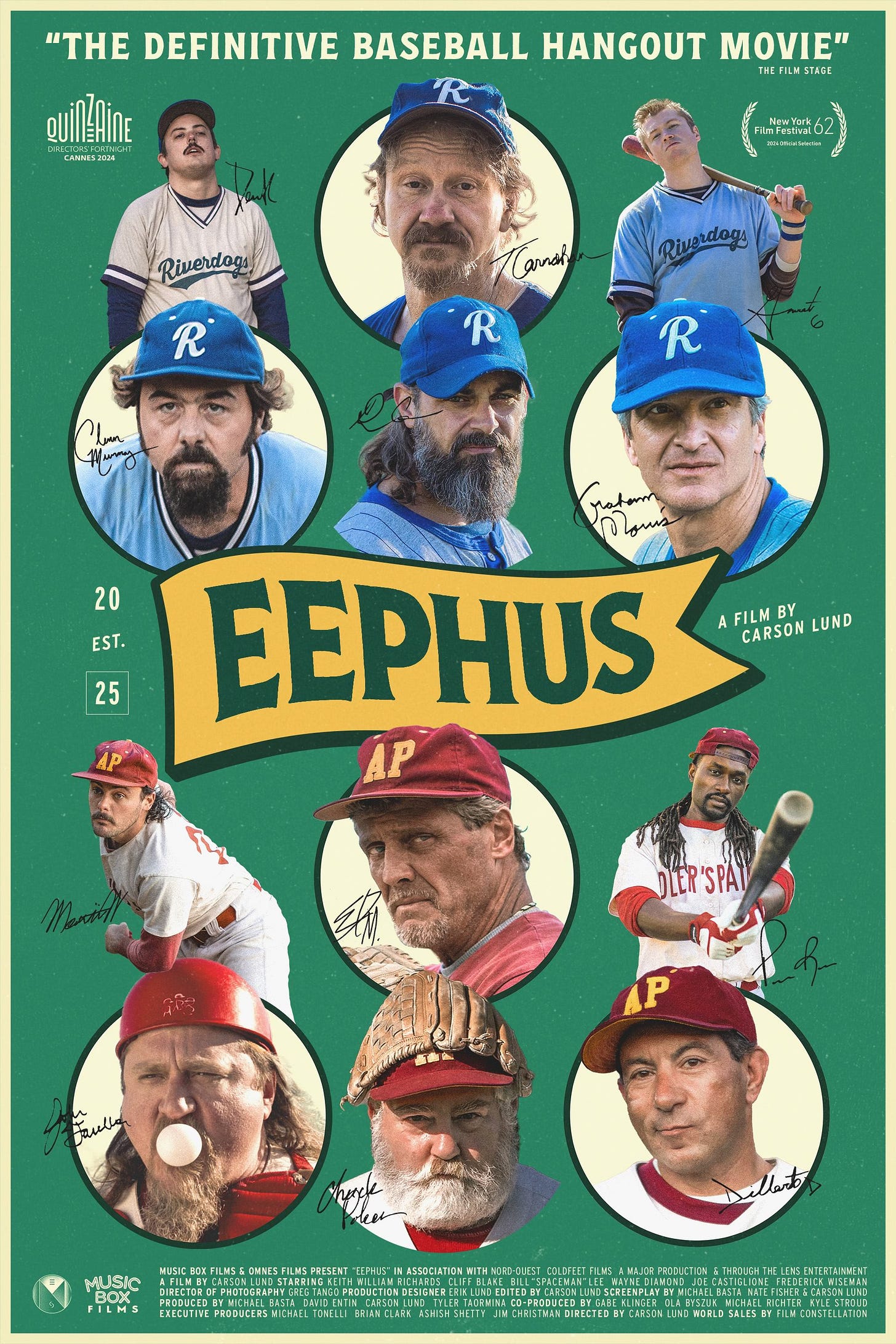First impressions of Eephus
I'm back from a long, hard road to offer my overdue review of one of the year's funniest movies: an elegiac comedy about America’s declining traditions and communities.
I’m back! Wow — how can it already be June 23rd? I’ve only posted a review for one movie so far this summer: The Life of Chuck, a film I’m happy to put behind me. Normally, I’d be posting more than once a week.
But these past few weeks have been a marathon of ordeals and troubles. In the last two weeks alone: I’ve given and then graded film-class and creative-writing-class finals; I’ve closed up the office for the academic year, an act comparable to Spring Cleaning in a big house; I’ve attended painful events to say farewell to colleagues whose positions and programs have been cut (Seattle Pacific has “curtailed” Theater, Philosophy, Languages, Classics, Journalism, and much, much more, making the place almost unrecognizable to those of us with history there); I’ve edited and completed my latest book (which is, ironically, about how movies and a liberal arts education saved my faith and transformed my life), a project I’ve labored over for more than a decade, and turned it into the publisher; and I’ve gone to Portland and back twice, once to help my mother and brother plan my father’s memorial service, and another time to actually attend the service, which was long, crowded, and emotionally taxing.

Notice: I’m not going into detail about the background noise — all of those Apparently End-Times Apocalypses blazing amidst the ruins of American democracy. The best thing I can say about the urgency of my recent challenges is that they have distracted me from the tidal waves of American evils surging around the globe. All in all, I’m exhausted both emotionally and spiritually. I need to sleep and sleep and sleep and rest and stare at the ocean and pray for the restoration of my strength and my spirits.
And I need great art like I’ve never needed it before. I need to return to my work of highlighting signs of life in arts and culture.1 I’ll go on a run of writing posts about art that has been nourishing my mind and my spirit over the past few weeks. And it feels appropriate, as we grieve together the loss of so many good things, to begin with a movie about the sun setting on a meaningful tradition.
Over the last few years, I’ve noticed a surge in low-budget films that seem unconcerned with mass appeal, but instead reflect an intense dedication among the collaborators to recreate the world in a spirit of play. I’m thinking of last year’s Gasoline Rainbow, Riddle of Fire, and even Hundreds of Beavers. This year, it’s a casual hang of a baseball comedy called Eephus, the feature-film directorial debut of Carson Lund, from a screenplay he co-wrote with Michael Basta and Nate Fisher. What they’ve made is a gift to any audience who settles in for its easy pleasures, a warm relief from the tyranny of the urgent. Eephus has as much or more heart than any movie we’re likely to see this year.
Eephus, set in Douglas, Massachusetts sometime in the 1990s, tracks the final amateur-league baseball game played by a community of middle-aged men—two teams, the Riverdogs and Adler’s Paint. They love this ritual, playing not for money or fame, but, yes, for the love of the game. They come to test themselves, past their prime, in the rigors of nine innings—pitching, batting, catching, boasting, reminiscing, ranting. They come for exercise, for escape, for companionship, for an audience.
And yet, it’s not just the game they love — it’s the place. Soldier’s Field (a real place with a remarkable history) is about to be bulldozed, making room for a school. Lund cleverly subverts the familiar narrative formula of “Beloved Property Gets Bought and Spoiled by Predatory Corporate Forces" here; it’s hard to get upset about the establishment of a school, and you can feel these men struggling to express their frustration and grief without sounding petty.

Still, it’s easy to feel their pain. There’s something beautiful about this dilapidated facility, a stage surrounded by trees and suburbs, attracting an audience of neighborhood wanderers, children, and nostalgic visitors (maybe even a ghost?) who may or may not be welcomed right into the game. It creates a stage upon which anything might happen. The players come here, as Nicole Kidman would say, for magic. For “magic hour,” specifically. There’s a sense of time passing — not just the obvious matter of biological time (you can feel the early-stage arthritis, the old injuries flaring up again), but the graceful gradations of a summer afternoon fading into evening and, eventually, into a dark night with bugs swirling around the ballpark spotlights.
I knew even halfway through that Eephus would be my favorite baseball movie. And yes, I’ve seen Eight Men Out (which I love), Moneyball (which I enjoy), The Sandlot (a joy), The Rookie (inspirational), and Field of Dreams (which doesn’t do anything for me or my cold, dead heart).
Keep reading with a 7-day free trial
Subscribe to Give Me Some Light to keep reading this post and get 7 days of free access to the full post archives.






